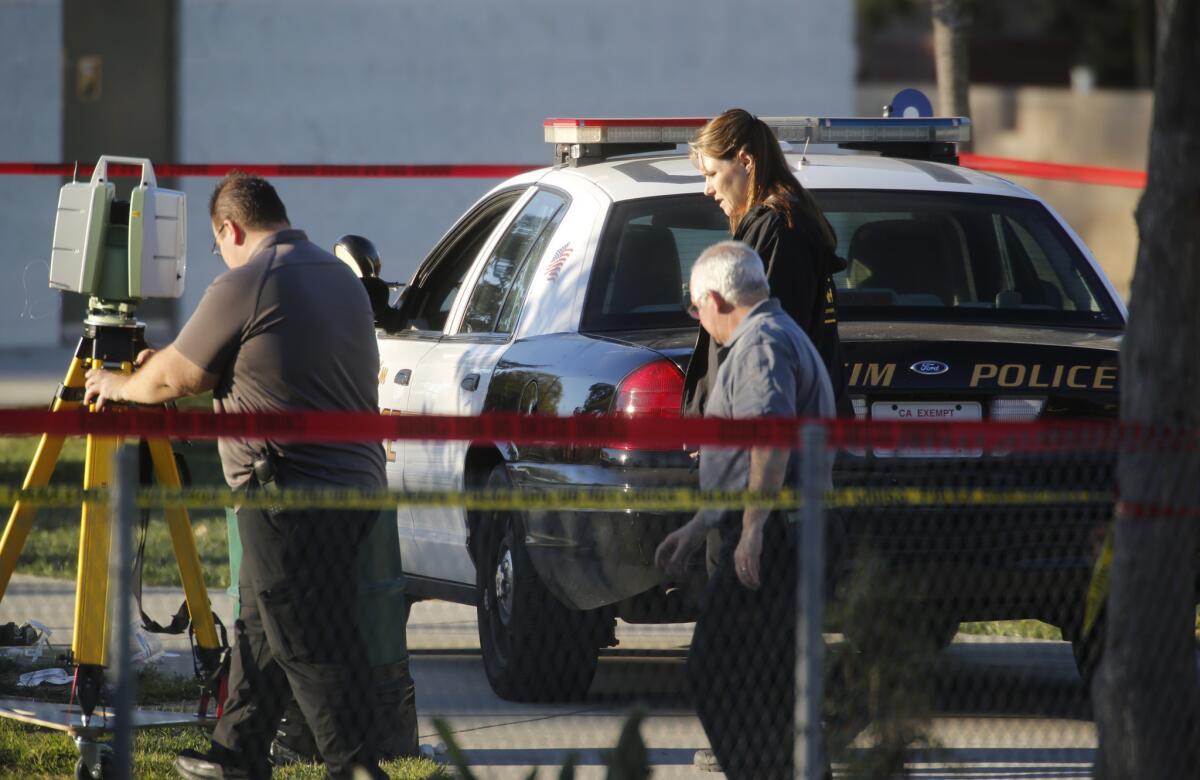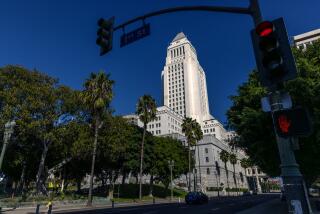Lawmaker proposes giving public access to police shooting and misconduct cases

Investigators pass by the patrol car where an Anaheim police pfficer shot and killed a 22-year-old man in Sage Park in Anaheim on Feb. 9.
Reporting from Sacramento — Investigative files involving police shootings and sustained misconduct by officers would be made public under legislation proposed Friday to lift the veil of secrecy and restore public confidence in law enforcement.
State Sen. Mark Leno (D-San Francisco) proposed the change to bring California in line with 10 other states, including Texas and Florida, that provide public access to investigative details, findings and disciplinary actions when officers are found to have acted improperly.
“The public has a right to know when officers apply deadly force and when serious cases of misconduct have been confirmed,” Leno said. “Failing to disclose such important information can fuel mistrust within our communities and threaten public safety.”
Join the conversation on Facebook >>
He cited several police shootings throughout the country that have been caught on videotape and raised public outrage.
The bill seeks to increase access to records that has been restricted by state law and further limited by court decisions.
Leno’s bill would require public access to records from all investigations into uses of force, including shootings, that result in deaths or serious injury. The records would be open even if the officer eventually was found to have complied with a department’s policy.
The LAPD releases summaries of the findings in such cases, but Leno said the public has a right to see the entire report, including information on an officer’s previous uses-of-force and disciplinary history.
Other departments do not even provide a summary of findings in officer shootings, according to Peter Bibring, an attorney for the American Civil Liberties Union of Southern California.
Investigative records and findings also would be made public, under the legislation, in cases where officers are found by their department to have engaged in misconduct that violates the legal rights of the public, including sexual assault, lesser uses of force, planting evidence, racial profiling and unlawful arrests.
In addition, the bill would require records to be released when departments find an officer engaged in job-related dishonesty.
The legislation also would allow police and sheriff’s departments to open hearings to the public when officers appeal disciplinary action and when citizen complaints are heard.
Also, citizens who file complaints against the police would be given information including whether the complaint was sustained, the factual findings and any discipline imposed or corrective actions taken.
George Gascon, the district attorney for San Francisco County, said the failure to make police disciplinary records public “contributes to the feeling that police departments are hiding something, even when they are not.”
The measure faces an uphill battle, with opposition expected from powerful police unions.
A similar bill in 2007 died in a legislative committee after dozens of peace officers testified to lawmakers that permitting public access to police disciplinary files would endanger lives. The Times later reported that law enforcement advocacy groups were unable to identify a single case in which an officer had been harmed because of the release of such information.
“Those states (that open records) have not seen an increase in threats to officers,” Leno said at a San Francisco press conference. “With greater public access, public trust follows.”
The California Peace Officers Assn. plans to review the proposed bill before taking a formal position, but its president, Sacramento Sheriff Scott Jones, raised privacy concerns Friday about releasing information on citizen complaints.
“To require disclosure in every case would be unfair in a process by which an agency is required to take and investigate complaints and its officers have little or no control over any complaint that may be made against him or her, or the resultant investigation,” Jones said.
Leno cited a 2014 poll that found 30% of Americans believe that law enforcement nationwide is doing a good or excellent job of holding officers accountable for misconduct. Only 10% of African Americans felt that way, according to the poll by the Pew Research Center.
A separate survey last year found that nearly 80% of Californians believe the public should have access to the findings and conclusions of sustained police misconduct, Leno noted during a news conference at the Hiram W. Johnson State Building.
The measure is supported by the California State Conference of the NAACP, the California Newspaper Publishers Assn. and the Conference of California Bar Assns.
MORE POLITICS NEWS
California safety board rejects condom requirement for porn films
Opposition campaign launched against Gavin Newsom’s gun control initiative
Nancy Pelosi won’t pick sides, but praises Bernie Sanders for ‘attracting young people’
More to Read
Get the L.A. Times Politics newsletter
Deeply reported insights into legislation, politics and policy from Sacramento, Washington and beyond. In your inbox three times per week.
You may occasionally receive promotional content from the Los Angeles Times.











